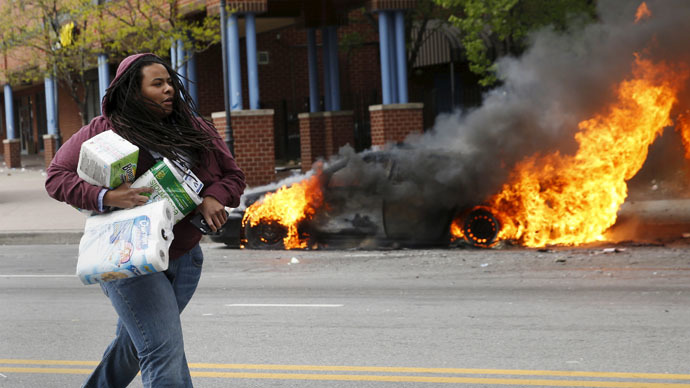Thirty-four murders have occurred in Baltimore, Maryland during a recent 30-day span, while still reeling from the riots that broke out last month following the death of Freddie Gray. The city has seen a surge in violence compared to last year.
The Baltimore Sun reported this week that 164 non-fatal
shootings occurred in the city between January 1 and this Monday,
and at least 96 homicides have been documented during that same
span.
Yet while crime is indeed on the rise this year compared to
statistics from 12 months earlier, the weeks since Gray’s passing
have been especially marred by violence, spawning more than one
death per day.
Gray, a 25-year-old black man, was arrested by the Baltimore
Police Department on April 12 and died a week later from injuries
sustained while in custody. His arrest and subsequent death gave
way to protests that later turned violent and prompted the
deployment of the National Guard. The city has been struggling to
rebuild in the weeks since.
READ MORE: Baltimore riot: Violent clashes, tear
gas, rubber bullets after Freddie Gray funeral
However, as the city struggles to regain normality in the
aftermath of the Gray riots and international attention they
attracted, new crime data shows that Baltimore – and particularly
his former neighborhood in which the BPD’s Western District
operates – has hosted activity that’s anything but desirable in
the month since his death.
“Although riots and protests after the death of Freddie Gray,
who was injured in police custody, brought national attention to
the city, the slayings have attracted little notice,” Peter
Hermann wrote in the Washington Post this week.
Citywide homicides are up almost 40 percent compared to the same
time last year, and nonfatal shootings have surged by 60 percent,
the Sun reported this week.
Baltimoreans have “almost been anesthetized” to the
killings, local pastor and activist Reverend Jamal H. Bryant told
the Post. “In any other community, these numbers would be
jaw-dropping.”
Of the nearly 100 murders that have unfolded since the start of
the year, at least 20 have occurred in the Western District, and
that part of the city now needs to see only one more homicide in
the next six months to be on par with last year’s statistics.
Baltimore has around 620,000 residents, according to Census
Bureau statistics, making it close to Memphis, Tennessee in terms
of population. Yet while recent Federal Bureau of Information
stats have placed both of those locales on lists of the 10 most
dangerous American cities as of late, the Memphis Commercial
Appeal newspaper says there have been only 36 known homicides in
that city this year – less than one-third of what Baltimore has
witnessed during that same span. Washington, DC, the nearest
metropolitan city to Baltimore, has seen only 40 murders so far
this year among its roughly 660,000 residents.
Six BPD officers have been indicted with charges related to
Gray’s death, and the US Department of Justice has since opened a
federal inquiry to examine if any other misconduct can be
detected in the force. Meanwhile, officials say the man’s passing
and the response since has hardly made it easier to police the
city.
“Officers are coming up to me and saying, ‘I’m afraid to do
my job,’ ” Lt. Kenneth Butler, a president of a group for
black officers, told the Post. “Morale is low” across
the board, Butler said, and all officers regardless of race are
“equally upset” over the crime wave that continues to
sweep the city.

